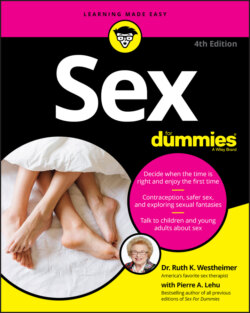Читать книгу Sex For Dummies - Pierre Lehu A., Dr. Ruth K. Westheimer - Страница 75
Easing into menopause
ОглавлениеMenopause isn’t something that occurs suddenly. Usually the changes develop slowly, and the period of change is called the climacteric. A woman’s period may become irregular and the flow lighter or heavier. The actual length of time for the woman to cease having periods may be one to two years from the start of the climacteric.
However, women may start having hormonal symptoms as many as 10 to 15 years before menopause, and this period of time is known as perimenopause. During perimenopause, the egg-producing follicles in a woman’s ovaries may become resistant to FSH (follicle stimulating hormone), which is what kicks off ovulation. In an attempt to get those eggs released, the body produces extra FSH, causing a spike in estrogen levels. But because the body produces no normal matching increase in progesterone, rather than a steady decline in hormones, a roller-coaster effect results, which may cause a variety of symptoms including abnormal bleeding, depression, and even hot flashes (see later in this section for a further explanation of this symptom).
Abnormal bleeding may cause your gynecologist to order an endometrial biopsy and/or a dilation and curettage (or D&C). An endometrial biopsy is done in your gynecologist’s office. A small tube is inserted through the cervix into the uterus, and a sample of the endometrium, the lining of the uterus, is extracted for microscopic evaluation. A D&C is an invasive scraping of the uterus done in the operating room under anesthesia.
But new techniques using sonograms are now available that can prevent you from having to go through a D&C, so talk to your doctor extensively before agreeing to any procedure. If your doctor doesn’t have the necessary equipment to perform the new, less invasive procedures, then you may want to find one who does.
Just being aware of perimenopause can bring you great relief because you’ll at least know that you’re not going crazy.
A classic symptom of menopause is the hot flash, a sudden feeling of heat that takes over the entire body. This can happen at any time of the day or night, and the number of hot flashes and their duration is different for every woman. Because the woman’s face usually also becomes flushed, these hot flashes may be visible to the entire world and can be embarrassing, though she certainly has no need to feel embarrassed. Although not every woman experiences hot flashes, the normal duration for this symptom is two years. About 25 percent of women have hot flashes for a longer period of time if they go untreated, right into their 90s. (Skip ahead to the section on hormone replacement therapy to learn more about the treatment.)
The decrease in hormone production during menopause also causes changes in the vagina and bladder. The vaginal walls thin out, causing vaginal dryness. This dryness, in turn, can cause burning, irritation, and decreased lubrication, which can result in painful intercourse (see Chapter 19). Similar changes in the bladder can cause a woman to feel the urge to urinate more frequently.
Many women also experience some psychological changes, although these haven’t been medically proven to be tied to the effects of menopause. They may, in part, be due simply to interruptions in sleeping patterns caused by the hot flashes, or to a woman’s reflections on this permanent physical change in her life, which signals the end of youth.
Some harmful side effects of menopause may be osteoporosis — a loss of bone strength caused by lower levels of calcium being retained — and possible heart problems.
If you know any families who have two or three children grouped around one age bracket and then another child who arrived ten years later, the odds are that this last child was a “mistake” caused by the onset of menopause. As I said, menopause takes a few years to settle in, and during that time a woman who had regular periods all her life may find that they suddenly become irregular. So if you are of menopausal age and your periods stop for two or three months, don’t assume that you won’t have any more. You very well may ovulate again, and if you have unprotected sex, then you may find yourself changing diapers at a much later age than you ever intended. Under the medical definition, a woman reaches menopause when she hasn’t had a period for 12 months, so never consider yourself to be into the menopausal years until that period of time has elapsed.
